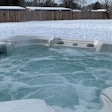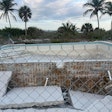
Over the last four years, the pool and spa industry has felt like the opening line of Charles Dickens's "A Tale of Two Cities" — "It was the best of times, it was the worst of times.
We witnessed unprecedented demand and record-breaking sales, but this success was tempered by severe supply chain limitations and the challenges of a global pandemic. Although sales in nearly all categories were strong from 2020 to 2023, the demand for new pools, hot tubs, and retail products has become uneven — still strong in some places and declining in some markets.
The good news is that the record numbers of new pools and spas all have one thing in common: a need for service and maintenance. Could service be your next big growth opportunity?
I spoke with industry experts about the demand for service and maintenance, including what their most popular weekly and bi-weekly maintenance programs look like as well as their best advice for running a successful department.
The Demand
As demand in some locations levels off for retail sales, new inground pool construction and hot tubs, the focus is shifting toward the growing market for service and maintenance. My conversations with pool and spa dealers reveal a rapidly growing demand for these services, driven by multiple factors.
Scott Bowling, service manager at Burton Pools & Spas in Arkansas, notes the demand for pool and spa service surged significantly during the early stages of the COVID-19 pandemic and has continued to grow since. "We saw a noticeable increase in service needs four years ago during COVID," says Bowling. "Our service departments continue to expand, largely due to continued population growth in our area."
Jacob Beninati, CEO of Beninati Pool and Spa in the Greater Detroit, Mich., area, is shocked at the amount of service and weekly maintenance requests other companies are turning down. "Demand has reached unprecedented levels," says Beninati. "Most new homeowners lack knowledge of pool systems, which means they rely more heavily on our services compared to previous owners." He adds that the rate at which pools are being installed far outpaces the growth of local service providers, as many competitors who focus on sales and installations have closed their service departments to prioritize new installations, which creates a void in the service world.
The rising demand is echoed by Tracy Campbell, COO of Isaacs Pools & Spas in Johnson City, Tenn. She also attributes the increase to the influx of new residents in the area. "A lot of people have moved into our market and bought homes with pools and spas, expecting someone else to handle the maintenance and repairs. We've seen a continued increase in demand."
Consistent growth in service is expected as more pools and spas are sold, but what industry professionals are observing is something more. The surge in demand is partly due to companies that do installations but lack the resources to offer ongoing service and warranty support. This challenge is exacerbated by the "COVID Demand" boom. Additionally, new homeowners often aren't familiar with their pools and spas, especially when they are equipped with complicated features and more advanced technologies.
The Opportunity of a Lifetime Must Be Seized During the Lifetime of the Opportunity
Okay, I admit it. That might be a little bit dramatic, and while there is no "one- size-fits-all" approach — demand varies by market, and some companies already lead the way in service — one thing is clear: The growing need for service represents a significant opportunity to expand operations and capture a larger share of the market.
In South Dakota, Tom Junk, president of Combined Pool and Spa, sees this as a huge opportunity, even more so as many new pool businesses and landscapers who thought they could be pool builders during COVID are now weeding themselves out. "There are also more pool builders that don't offer service, so we plan to try and capitalize on that opportunity," he says. "Our staff also wants to be part of something that's growing and exciting, which provides new opportunities for them to grow both personally and professionally within the company."
To successfully grow in service, it's also important to place a strong focus on your current customers. Jeannie Daugherty of Ohio Hot Tub & Sauna says, "We will continue to grow our water care services and focus on our existing customer base while welcoming new clients."
Bowling echoes this approach, stressing that "maintaining our core customers is essential for business growth." He adds, "Providing quality service and retaining these customers is a major component in our growth strategy."
Beninati, on the other hand, will focus on growing both service and maintenance, especially for hot tubs where competition is limited. "We've already begun calling past hot tub customers, and educating them on our service plans, as most don't know it's even an option," he says. "We also highlight our service department in all ads, whether print or radio, to inform the masses we are more than just an installation company."
Although growing in a market where demand for construction of high-ticket items like pools and spas is trending downward can be challenging, robust demand for weekly and bi-weekly maintenance likely presents the best chance. To explore this further, I sought insights from industry experts on their weekly and bi-weekly maintenance programs.
The Weekly & Bi-Weekly Program
Weekly or bi-weekly maintenance programs for pools and spas come with logistical challenges, but they can offer significant benefits for your business. While maintenance "routes" are common in some southern states and tourist areas, they're less common in places where pools and spas are spread across a larger geographic area. Nonetheless, finding ways to establish weekly maintenance routes can pay off.
Campbell says one of the benefits to establishing routes is a recurring income. "Even in the winter, when we close some of the pools, we're able to maintain pools that can't be winterized," she says. "Hot tubs, on the other hand, give us the most consistent, recurring income."
Junk agrees: "We have had a tremendous increase in demand, and people asking for weekly maintenance. It is also recurring revenue, which is a big focus for us."
The importance of recurring revenue in a maintenance program can't be overstated — it not only ensures a consistent cash flow but also makes the business more valuable and potentially marketable.
But there's more to it than just financial stability. The role of a maintenance technician does not require the same skill level as an expert service technician, so the positions are easier to fill and, in some ways, easier to replace. By starting maintenance techs with minor repairs, putting
them through service training, and having them cross-train with more experienced service techs, you can develop a pipeline of skilled workers.
Lastly, your maintenance technicians will be your best referral system for the rest of your company. As the first point of contact, they can see when a pool or spa is in disrepair or in need of service and direct that work straight to the service department. In some cases, it may even lead to renovation referrals for the construction department.
 The growing need for service represents a significant opportunity to expand operations and capture a larger share of the overall pool and spa market
The growing need for service represents a significant opportunity to expand operations and capture a larger share of the overall pool and spa market
Expert Advice
To get a better understanding of what it takes to start, grow, or improve a maintenance program, I asked the experts for advice. Their answers were too good not to share in full.
Beninati Pool and Spa, a company with 25 years of experience, operates with a team of 14 service technicians and eight maintenance techs. According to Jacob Beninati, the company's most popular maintenance program involves weekly full cleanings for pools, with chemicals billed separately. "We service hot tubs every other week, with chemicals included in the price. We split our service company in half — repair teams do equipment installs, openings and closings, and the maintenance side does hot tub and pool cleanings."
Beninati's advice: "I believe the foundation of any good service company is customer service. The client needs to be able to reach you during normal business hours every time. So many times we get a customer because we simply answered the phone and quoted a timely repair, and the competition did not."
Ohio Hot Tub & Sauna has been in business for 67 years, and has four service techs and five maintenance techs. Jeannie Daughtery says their most popular program "is our bi-weekly maintenance. Our weekly premium service does include chemicals. Water care is a division of our service department."
Daughtery's advice: "Establish relationships within our industry. Attend conferences, educational events, build business relationships and network with your peers."
Combined Pool and Spa has been in business for 30 years, and has nine service technicians and four maintenance techs. Tom Junk says, "For swimming pools, our once-a-week program is the most popular and for the customers that are totally hands off, we visit twice a week. We deliver a standard start-up chemical supply at the beginning of the season and then bill them for any additional chemicals as they run out. Our service scheduler currently schedules those customers but will plan on adding an additional "Special Account" person for just those customers."
Junks advice: "You don't want every customer. It's okay to fire some. Route them efficiently. Over-communicate. Know your costs, know your worth. Do what you say you are going to do, and you are fine!"
Burton Pools & Spas has been in business for 46 years, and has 28 service techs and four maintenance techs. Scott Bowling says: "Our maintenance program is run through our service department, consisting of techs that focus primarily on these stops. We have found that weekly maintenance is the most cost-effective route to follow. Our techs show up, brush the pools and clean. We carry spin doctors that test the water on site. Chemicals are NOT included with our program and are charged accordingly."
Bowling's advice: "Sometimes it's better to just say no when approached about a job. Over-promising that your company can do a particular task with the final job's revenue dollars being all that you see is a recipe for potential disaster. We feel that the service department is our biggest opportunity for company growth and are focusing on improvements and training programs to keep us on track."
Isaacs Pools & Spas has been in business for 46 years, and has six service technicians and four maintenance techs. Tracy Campbell says, "Spa Valets sold with new spas include weekly maintenance, drain and refills, filters, and chemicals. We also provide the option for new spa customers to sign up for regularly scheduled maintenance, which includes drain and refills. All other weekly and bi-weekly maintenance for pools and spas includes labor plus chemicals."
Campbell's advice: "Invest in good scheduling software, tracking devices for the service vehicles, and good communication / texting services, and training. From there, take a deep look at your pricing and make sure you are profitable on your labor, parts, and whole goods."
In Conclusion
Through my interviews for this article and countless conversations with pool and spa professionals, one conclusion is clear: Regardless of what happens to demand for new pools and spas, the need for professional companies to provide service and regular maintenance remains strong. The opportunity to grow your service and maintenance department is now!
I'll leave you with a final thought from Beninati: "I was around for the last slowdown in 2008, and without our service company, we wouldn't be in business today. I believe the only way to weather the ups and downs of new installations is to have a profitable service division. Almost all of our growth over the next five years will be credited to our service company."
This article first appeared in the November 2024 issue of AQUA Magazine — the top resource for retailers, builders and service pros in the pool and spa industry. Subscriptions to the print magazine are free to all industry professionals. Click here to subscribe.













































